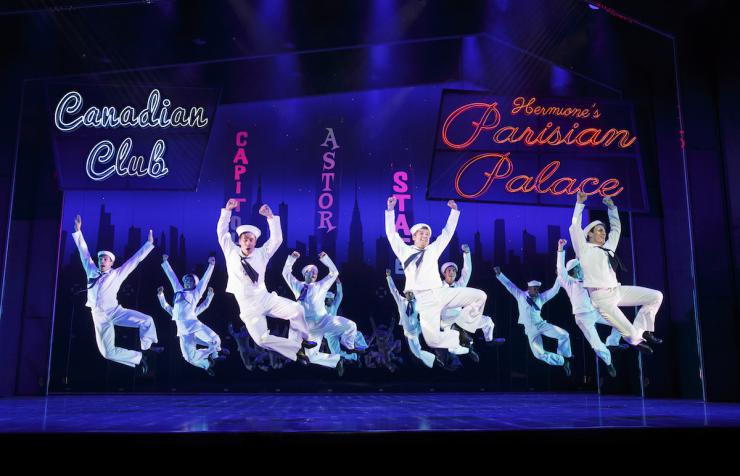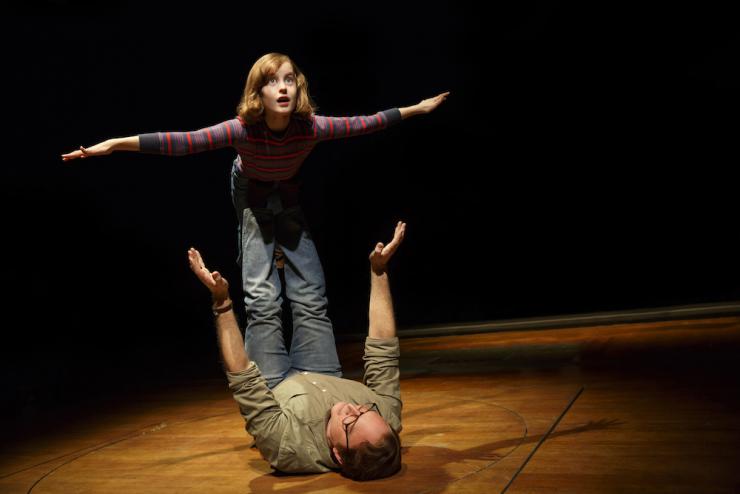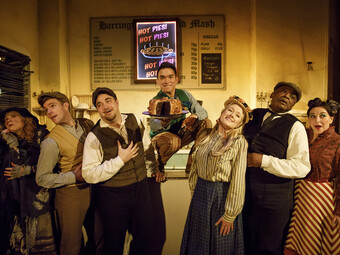In Defense of Broadway. Plus 2015 Must-See (And Can-Afford) Shows
“Oh I won’t be watching the Tony Awards,” a professional actor I know told me. “It just doesn’t interest me.” He’s far from alone. This attitude always surprises me. Would a football player disdain the Super Bowl? Yes, it’s different. The Super Bowl is the ultimate football game. The Tony Awards is a TV show. But this TV show celebrates theatre. No, some would respond, it promotes Broadway. And that, I suspect, is the real complaint. Many theatre people seem to see Broadway as completely different from what they do and what they like, almost as if the “commercial theatre of Broadway” is not really theatre at all.
Many theatre people seem to see Broadway as completely different from what they do and what they like, almost as if the ‘commercial theatre of Broadway’ is not really theatre at all.
The Case Against Broadway
This dismissive attitude is in part, I understand, a reaction against the opposite view of the public at large. As Melissa Hillman put it last year: “Broadway is a tiny percentage of the theatre that happens in this country, yet we talk about it as if it’s the most important theatre in the country—or the only theatre in the country.” Hillman made this point in her blog post entitled “Why I Don’t Watch The Tonys,” which lays out some familiar arguments against Broadway:
- “Entirely risk-averse… When the risk is ten million dollars (or more), you’re going to choose a revival starring Hollywood celebrities or a splashy, safe musical almost every time.”
- Too expensive, and too willing to confuse money with quality.
- Not inclusive enough, in many ways. To pick just one way: Terrific playwrights like Maria Irene Fornes, Amy Herzog, Lynn Nottage, Ping Chong, Tarell McCraney, and Paula Vogel have never had any work on Broadway.
Hillman is a respected theatremaker—the artistic director of Impact Theatre in Berkeley, CA., she holds a PhD in Dramatic Art from UC Berkeley—and one of my favorite theatre bloggers. It is hard to brush aside many of her points (my summary doesn’t do justice to her well-written reasoning). But she admits to not knowing nor caring about Broadway, and in this way I think she may be typical. However legitimate their complaints, many Broadway belittlers present an incomplete picture, perpetuating several misconceptions.
The Tony Awards Do Not Equal Broadway
I’ve written for HowlRound before about theatre awards. I have mixed feelings—I think there are too many of them, and especially too many that are self-serving. I see plenty of flaws in the Tonys. But it seems strange that people who have devoted their lives to the theatre routinely skip sharing the one night a year that (for better or worse) defines “theatre” for many Americans; shouldn’t we all be acquainted with general public perception, if only to combat it?
More to the point, the Broadway belittlers make the mistake of conflating the Tony Awards with Broadway. The nature of a network television broadcast creates pressure to produce a TV show that will get good ratings, not one that reflects the full range of work on the Great White Way. That is why, for example, every year on the Tony broadcast, the straight plays are given insultingly short shrift.
But it seems strange that people who have devoted their lives to the theatre routinely skip sharing the one night a year that (for better or worse) defines ‘theatre’ for many Americans; shouldn’t we all be acquainted with general public perception, if only to combat it?
The truth is, there is plenty that is worthwhile on Broadway, maybe more this season that has just concluded than most. And, equally important, there are some promising developments.
Broadway is Inextricably Tied to Not-for-Profit Theatre
Almost all the Tony nominated shows this year originated in not-for-profit theatre, as pointed out in an article in American Theatre:
Both The Curious Incident of the Dog in the Night-Time and Wolf Hall are British imports (from the National and the Royal Shakespeare Company, respectively), and both Ayad Akhtar’s Disgraced and Robert Askins’s Hand to God have a strong nonprofit pedigree: The first premiered at Chicago’s American Theater Company before opening Off-Broadway at Lincoln Center in 2012, and the second enjoyed a meteoric rise from two Off-Broadway runs, at Ensemble Studio Theatre, then MCC Theatre.
Now, one could argue, from one perspective, that this is actually a sign of Broadway’s decline—that it cannot generate its own quality hits. Perhaps. But it’s also a sign that Broadway is more an intrinsic part of American theatre than its detractors allow.
Indeed, three not-for-profit theatrical institutions have run Broadway theatres for years. The Roundabout owns both Studio 54 and the American Airlines Theatre. The Manhattan Theatre Club owns the Samuel Friedman. Lincoln Center owns the Vivian Beaumont.
And now, Second Stage Theatre has finally closed the deal on its long-time plan to purchase the Helen Hayes on Broadway, the fourth not-for-profit to own a Broadway house. It’s important to point out that Second Stage has produced the work of both Lynn Nottage and Paula Vogel (two on Hillman’s list of Broadway-excluded) and that they have explicitly stated that part of their reason for buying the Helen Hayes was to make Broadway more inclusive.
“Entirely Risk Averse”? Try Socially Conscious and Adventurous
“I cannot believe we live at a time when Airline Highway, Hand to God, Fun Home and Hedwig are all on Broadway,” Mariah MacCarthy, a theatre artist who works primarily Off-Off Broadway, tweeted recently. “Maybe Broadway has secretly been this adventurous for years and I was too broke to notice, but I don't think so.”

Not just adventurous, but socially conscious. “I was struck that this season even Broadway—where plays of political relevance are as rarely sighted as tumbleweeds on 42nd Street—hosted a handful of productions that spoke to contemporary concerns,” New York Times critic Charles Isherwood wrote, “including radical Islam and the topic that’s likely to be on the lips of every politician on the long and windy road to the presidency: the country’s increasing income inequality.”
Despite the snark, this adventurous and socially conscious—risky—streak is nothing new…. and shows no signs of disappearing. “I was in Bloody, Bloody Andrew Jackson; that was risky,” says the actress Kristine Nielsen, who has been in nine Broadway productions. “A play about Alexander Hamilton set to rap music? Is that ‘risk-averse’?” (She is talking about Hamilton, which moves to Broadway in July.)
Both these musicals, as well as more than sixty other shows over the past half century, have been Broadway transfers from, or co-produced by, the not-for-profit Off-Broadway institution called The Public Theater. It’s safe to say that most of the Public’s shows were “risky” at the time, although in retrospect it’s tough to view such huge successes as Hair and A Chorus Line that way.
“Is Broadway risk-averse? Sure,” says Oskar Eustis, the artistic director of The Public Theater for the past ten years. “It makes sense if you’re investing large sums of money to want a return on your investment.” Eustis is certainly not Broadway-averse. “It’s a commercial enterprise, a different set of values, but it’s the biggest platform we have in the theatre.”
There are plenty of examples of quality shows that have made it to Broadway, risky though it may be. Some of these quality shows were indeed revivals starring Hollywood celebrities (such as Denzel Washington in Fences), and yes, some of them splashy musicals (The Book of Mormon)—and some of them have been none of those things.
Must-See Can Also Be Can-Afford
“The price of Broadway tickets is really dismaying,” says Eustis, and its effect is to make Broadway less inclusive. “Race and class overlap: If there’s a financial limitation, that’s got to make the audience whiter.”
It is difficult to find anybody in the Broadway community who defends the high ticket prices. The closest (and it’s not very close) may be playwright Ayad Akhtar—who won a Pulitzer for Disgraced, which transferred to Broadway, and whose The Invisible Hand is slyly steeped in economics. “It’s a tough situation,” he says. Broadway is “the only place where you can make a living wage.”
But the open secret of Broadway is that an individual theatregoer with the time and the passion can find an affordable way to attend its shows. Many know about the TKTS half-price ticket booths, where you can get a ticket for shows that haven’t sold out that day for an average of about $80. There are cheaper “rush” tickets available—each show has its own rush policy. Check out Broadway for Broke People and Playbill’s more frequently updated article on rush, lottery, and standing room only policies. (There are also programs specifically for students, as well as so-called seat filler organizations that require an annual fee.)
To come up with an informal list of current shows that opened on Broadway this season (and are still running) that I consider both must-see and can-afford, I weighed the quality of the show against its affordability, with points given for the more regular the discount (every show), the more accessible to anybody (not just restricted to a certain age group, for example), and the greater your chances of getting in (not just a lottery). Using those criteria, there are three that are Must-See/Can Afford, and another two that are Could See/Might Afford. (Remember this is for Broadway shows currently running that opened in the season just ended.)
Must-See/Can Afford
Hand to God
A funny, filthy, violent, and sensitive story of a boy and his Satanic sock puppet, Hand to God is not just a theatrical version of Triumph the Insult Dog. It is full of surprises. At times, it teeters close to horror. There is also full-fledged, over-the-top satire. Each of the characters behaves in their own outlandish ways. But we aren’t able to write them off simply as caricatures, as we might in a Saturday Night Live sketch. We are made to understand that each is looking for ways to find relief from their pain.
- $27 general rush: a limited number of general rush tickets will be available when the box office opens on the day of the performance.
- $27 standing room: available on the day of the performance when the box office opens. Standing-room tickets are only available when the performance is sold out.
On The Town
The thrilling Broadway revival of the 1944 musical that brought us “New York, New York, it’s a helluva town” and introduced Broadway to Leonard Bernstein and Comden and Green, this production is most spectacular for the choreography by Joshua Bergasse.
- $20 mobile lottery in partnership with the TodayTix app.

Fun Home
Fun Home is a musical about a lesbian cartoonist whose closeted father killed himself, but it is also about how we try to figure out the puzzle of our parents. It is an expert theatrical adaptation of Alison Bechdel’s erudite graphic memoir, with a well-integrated score, and stagecraft that improved in its transfer from Off-Broadway to Broadway’s in-the-round Circle in the Square theatre, a rare occurrence. The musical manages to be innovative, exhilarating, and at times heartbreaking.
- $32 mobile lottery in partnership with the TodayTix app. (That the producers aren’t doing more to make this show affordable is really a shame, but it’s such a must-see that I couldn’t exclude it from the list.)

Could-See, Might-Afford
The King and I
From the very first moments of Lincoln Center’s ravishing The King and I, it feels like a privilege just to be sitting in the audience. It is hard to imagine a better Anna than Kelli O’Hara. O’Hara has found her match in Ken Watanabe. The King and I may not be universally viewed as among the best American musicals, perhaps one reason is its implicit politics.
- $32 student rush: each day, beginning two hours before a performance. LincTix: Lincoln Center Theater’s program for those aged 21-35 is free to join and gives access to $32 tickets for each new production at the Beaumont, Newhouse, and on Broadway.
The Curious Incident of the Dog in the Night-Time
I loved this show for its flashy stagecraft and for Alex Sharp’s performance.
- $37 general rush: this strikes me as too high to include in a list of must-see and can-afford shows.
- However the show does offer over fifty tickets at $27 for every performance. These are in the rear mezzanine.
The Broadway Community is Part of the Theatre Community
Geneva Carr, a former banker, agreed to play a part, for free, in a play Off-Off Broadway that she loved. “I had no idea it would lead to my Broadway debut,” she says. Carr has been nominated for a Tony Award for best actress for her role in Hand to God.
You work very, very hard, it’s surprisingly exhausting. And you do it because you love it. Nobody does this for money or recognition or anything but love, because the costs are so high; you have to be away from your family at night... But the payoff is when you’re on stage… It does not get any better than this, anywhere, anyhow.
***
Jonathan Mandell's NewCrit piece usually appears the first Thursday of every month. Find his previous pieces here.







Comments
The article is just the start of the conversation—we want to know what you think about this subject, too! HowlRound is a space for knowledge-sharing, and we welcome spirited, thoughtful, and on-topic dialogue. Find our full comments policy here
I can't resist adding an update that the two biggest winners at the 2015 Tony Awards were Fun Home, about a lesbian cartoonist and her closeted father who committed suicide, and The Curious Incident of the Dog in the Night-Time, about a 15-year-old on the autism spectrum.
Fun Home, which won for Best Musical, is so good it feels like a play.
The Curious Incident, which won for Best Play, is so good it feels like a musical.
Watch Ring of Keys from Fun Home, AND Lisa Kron's terrific (and to the point) acceptance speech (which was not televised)
http://newyorktheater.me/20...
Personally, I'm happy whenever people go to see live theatre. So in that way, if Broadway accomplishes that, fine.
At the same time, for MY money, when I visit NYC, I prefer to skip Broadway and go see something at BAM, St Ann's, LaMama, etc.
But I also try to do my best to encourage people to see stuff that's NOT on Broadway....because there's so much cool theatre that's happening that your average citizen never hears about.
I'm a huge fan of the theaters you mention, and much else Off and Off Off Broadway. But, unless visiting New York for only a day, why does anybody need to "skip" one in order to attend the other?
That's really what I mean. If I were only there for a day (or forced to choose), I'd see something at one of those first.
That said, I'd be interested in seeing several Broadway shows running now: Curious Incident, Fun Home
The costs and gamble of putting on a Broadway show and the surprising outrageous costs of being part of the Tony Awards (as explained in "The Business of Broadway"-Allworth Press) perhaps makes Broadway a riskier venture than anywhere else. Yes, it's a marketing tool for playwrights and other artists and it pays everyone a living wage - which can't be said about every theater in America. So let's celebrate that. I think playwrights everywhere should be celebrated, but every now and then, a producer sees a combination of excitement and provocative topic that tells them that there's a larger audience out there that needs to see it. That too is part of the Broadway experience. That's what producer Joe Papp did. He used Broadway as a vehicle for finding a wider audience because the play was "important" in his eyes. And so I think we are all better for those who use Broadway to advance our culture.
I'm taking the liberty of reprinting (slightly edited) three Tweets by Travis Bedard, the artistic director of Cambiare Productions theatre company in Austin Texas, who wrote that this article "in defense of Broadway is very well done, but community goes both ways and a year of quality and risk-taking is a data point, not a trend. I'm not sure that the conclusion to decades of important questions about the commercialization of NPOs for Broadway is LOOK[ing] GOOD BROADWAY!"
Broadway is home to many ofthe most talented, creative theatre artists in the world, doing some of the best funded and best supported theatrical projects. It is not all things for all tastes just as no regional theatre season is...to negate Broadway and the Tonys seems to me to be a combination of a kind of pretentious elitism and more than a little sour grapes. All theatre that is well done is good theatre, and those of us who live in this art should embrace all theatre and show ourselves to be supporters of the art and all our fellow artists.
Nice piece, Jonathan. Love that you reference the a-mah-zing Bitter Gertrude who I'm lucky enough to have at my beck and call...well, at least when I go over to submit to Mistress Melissa at Impact!
While I think the discussion is worthy, as with so many other things in life, I don't understand some people's need to diminish one side in order to prop up, justify or feel better about the other.
From my view, Broadway is just one of many theatre markets. It's the shiniest and possibly most pop-u-lahr one, but it's still just one. I've seen brilliant work on Broadway and I've seen brilliant work in a 100-seat second-floor studio here in San Francisco or even underneath a pizza parlor in Berkeley. I've also seen crap in all types of venues. (It is admittedly easier to recover from the disappointment of $20 crap than from the $200 variety.)
If I have any personal defense of Broadway as the pinnacle-cherry-mountaintop of American theatre (theater?) it is that its status as "the best of American theatre" - clearly valid or not depending on your dialogue partner(s) - is a shiny bauble that caught my eye 50 years ago and turned me into a lifelong lover-patron-supporter of Broadway first and then theatre anywhere I wander and ultimately in the embarrassingly rich bounty we have at home in San Francisco and the greater Bay Area. I don't think I am alone in that experience.
So while there are flaws - and many of them - with both highly commercialized theatre and valiantly independent theatre I think it is important to hold them both high as important points on the continuum that is American theatre and not belittle one over the other for just for the sake of emotional comfort.
You make the excellent point that Broadway is the gateway drug for many a young person who becomes a serious theater addict.
How, exactly, is it "risk-averse" for Broadway to take a show that's already been performed (and performed to sold out houses) and stage it? That's not risk: that's cashing in on a commodity.
To answer your literal question: It is exactly risk-averse. "Risk-averse" means avoiding risk, so, in your scenario, the Broadway producers are avoiding risk by going with a sure thing. But I think what you're really asking is: Why should Broadway get any credit for presenting shows that have established themselves as hits elsewhere? My response: 1. I'm not saying they should get any credit; my point was that Broadway has some good shows, and that it is not as separate from the rest of theater as its detractors maintain. 2. However, just because a show is a hit in a small downtown venue does not mean it will be so in a larger venue with a different demographic. Bloody, Bloody Andrew Jackson, for example, was a huge hit downtown, and lasted just 94 performances on Broadway. So, yes, there is some risk involved in a Broadway transfer even of a show that's been a hit elsewhere.
Gah; I totally had that backwards. That's what I get for typing before coffee.
I think Broadway is fine, but I don't think it's representative of American theatre in any capacity. We treat it like it's the crown jewel of our theatre ecosystem, but it isn't. It's just another market, albeit one where budgets are significantly higher.
This is why the Tony Awards are kind of useless: they're no more or no less important than the Jeffs or Helen Hayes. Broadway isn't representative of the type of theatre happening across the country: it's representative of the type of theatre happening on Broadway.
It's possible to appreciate what Broadway and off-Broadway offer without seeing them as the pinnacle of American theatre.
As I say in the piece, which is in "defense of Broadway" not of the Tonys, I have mixed feelings about awards. But to say that "Broadway isn't representative" of theater throughout the country is, at the very least, to ignore the fact that, as the industry trade association the Broadway League puts it, Broadway productions "are currently performing in more than 240 cities across North America."
Alright, putting aside the notion of the Tonys (though it's kind of a disservice to do so), Broadway isn't representative, I'm sorry. Shows that are successful on Broadway are picked up by regional theatres across the country, because those shows already have a marketing hook. That doesn't make Broadway representative: it makes Broadway some sort of de facto validator of shows that regional companies can market. It means regional theatres are following Broadway.
That being said, those shows (which often don't originate on Broadway) aren't necessarily any better or worse than shows that don't make it to Broadway. Some of the best productions I've ever seen are scripts that have never sniffed Broadway, touching on topics that you'd never see on Broadway.
I suspect that we're just going to have to agree to disagree on this. Because when the world points to the Tony Awards as "A celebration of the best theatre the country has to offer," the implication is that Broadway has the best theatre the country has to offer, a notion I completely disagree with.
I think you may need a couple more cups of coffee.
1. I don't understand the distinction you are trying to make between Broadway productions being presented and being "representative." Whatever the reason they're in hundreds of cities outside NYC, they're there.
2. Please tell me a topic that "you'd never see on Broadway."
3. Please find for me where I say anything close to: There is no theater as good as what's on Broadway.
We don't have to agree to disagree, because we agree that the Tony Awards are not "a celebration of the best theatre the country has to offer." (They're not even always a celebration of the best theater that Broadway has to offer.)